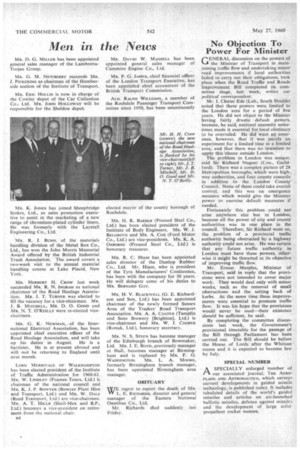No Objection To Power For Munster
Page 38

If you've noticed an error in this article please click here to report it so we can fix it.
GENERAL discussion on the powers of the Minister of Transport in maintaining traffic flow and undertaking minor road improvements if local authorities failed to carry out their obligations, took place when the Road Traffic and Roads Improvement Bill completed its committee stage, last week, writes our political correspondent.
Mr. J. Chuter Ede (Lab., South Shields) noted that these powers were limited to the London area for a period of five years. He did not object to the Minister having fairly drastic default powers, because, he said, national necessity sometimes made it essential for local obstinacy to be overruled. He did want an assurance, however, that it was purely an experiment for a limited time in a limited area, and that there was no intention to apply this 'clause outside London.
The problem in London was unique, said Sir Richard Nugent (Con., Guildford). There was a complex picture of 28 Metropoltian boroughs, which were highway authorities, and four county councils. in addition to the London County Council. None of them could take overall control, and this was an emergency measure which would give the Minister power to exercise default measures if needed.
Fortunately this problem could not arise anywhere else but in London, because all the power of city and county authorities was in one place in the council. Therefore, Sir Richard went on, the problem of a provincial traffic authority being obstructed by a highway authority could not arise. He was certain that any future traffic authority in London must have these powers, otherwise it might be thwarted in its objective of improving traffic flow.
Mr. Ernest Marples, Minister of Transport, said in reply that the provisions were not intended to cover major work. They would deal only with minor works, such as the removal of small obstructions and the setting back of kerbs. At the same time these improvemerits were essential to promote traffic flow. It was his hope that the provisions would never be used—their existence should be sufficient, he said.
By completing the committee discussions last week, the Government's provisional timetable for the passage of the Bill through Parliament has been carried out. The Bill should be before the House of Lords after the Whitsun recess and it is expected to become law by July.
SPECIAL NUMBER
A SPECIALLY enlarged number of our associated journal, THE AEROPLANE AND ASTRONAUTICS, which surveys current developments in guided missile technology, is published today. It includes tabulated details of the world's guided missiles and articles on air-launched ballistic missiles, defence against missiles and the development of large solidpropellent rocket motors.
















































































































